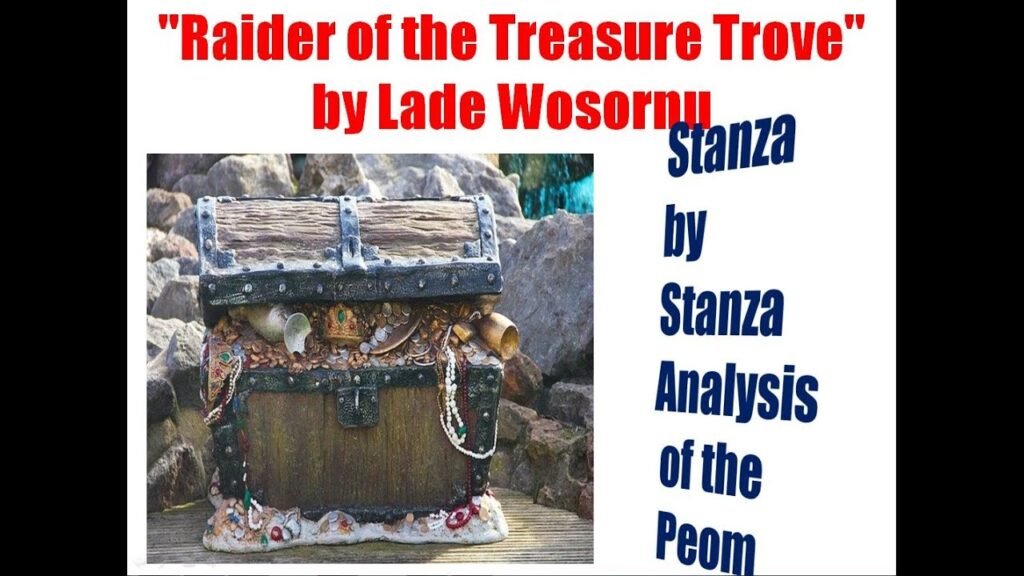Lade Wosornu, a distinguished Ghanaian poet, is known for his vivid, thought-provoking poetry that delves into themes of identity, exploration, and cultural heritage. In his poem “Raider of the Treasure Trove”, Wosornu explores the complex relationship between individuals and the treasures of their heritage—both material and spiritual. The poem weaves together themes of ambition, cultural pride, and the human desire to uncover and possess what is hidden, while questioning the true value of such treasures.
Summary of “Raider of the Treasure Trove”
“Raider of the Treasure Trove” tells the story of an individual seeking to find and claim hidden treasures. However, Wosornu does not simply focus on material wealth but expands the concept of treasure to include knowledge, culture, and identity. The title itself suggests a daring, almost adventurous spirit—someone ready to venture into the unknown to claim what is hidden or lost.
As the poem progresses, it becomes evident that these treasures are not only physical but also emotional and intellectual. Wosornu takes the reader through a journey of self-exploration, as the “raider” learns that what they seek may not always be the ultimate prize. The poem is a reflection on the human experience, the pursuit of goals, and the possible misinterpretations of what constitutes value.
Key Themes in “Raider of the Treasure Trove”
- The Quest for Knowledge and Identity:
The poem explores the theme of self-discovery and the quest to find one’s place in the world. The “treasures” in the poem are symbolic of the deeper understanding of one’s heritage, history, and identity. Wosornu portrays the longing for knowledge and wisdom as a driving force that shapes individuals, especially those seeking a connection to their roots. - The Dangers of Materialism:
Wosornu critiques the pursuit of material wealth as the ultimate goal, suggesting that the treasures people seek may not be as valuable as they initially appear. The poem points to the hollowness of chasing materialistic ideals, urging the reader to look beyond the surface and question what truly matters. - Cultural Heritage and Legacy:
The poem emphasizes the importance of cultural heritage, encouraging the exploration of one’s roots to understand who they truly are. The “treasure trove” can also be seen as a metaphor for African culture, history, and traditions that have been lost, forgotten, or neglected. The poem suggests that rediscovering and preserving these treasures is an essential part of personal and collective identity. - The Complexity of Ambition:
Wosornu uses the figure of the “raider” to reflect the complexity of human ambition. The raider is both a seeker of treasure and a symbol of greed, suggesting that ambition can often blind individuals to what is truly valuable. The poem raises important questions about the cost of ambition and whether it is worth pursuing something without understanding its true value.
Analysis of the Poem’s Structure and Language
- Tone:
The tone of “Raider of the Treasure Trove” is contemplative and reflective. Wosornu employs a tone that suggests both wonder and caution. The raider’s journey is portrayed as one of discovery, but also as one of potential loss and misjudgment. The tone invites readers to reflect on their own desires and the consequences of pursuing treasures without understanding their deeper significance. - Imagery and Symbolism:
Wosornu uses rich imagery to bring to life the treasures that the “raider” seeks. The “treasure trove” becomes a symbol for the broader quest for identity, wisdom, and the often-overlooked aspects of culture and heritage. The imagery of “raiding” suggests a sense of urgency and risk, while the hidden treasures represent the untapped potential and wisdom waiting to be discovered. - Language:
The language of the poem is introspective, using simple but profound language to communicate complex ideas. Wosornu’s choice of words evokes a sense of mystery and adventure, but also a deeper exploration of human motives and desires. He uses language to encourage the reader to look beyond the obvious and consider the deeper significance of what is sought after.
Poem Text: Excerpt from “Raider of the Treasure Trove”
Here is an excerpt from “Raider of the Treasure Trove” by Lade Wosornu:
“In the silence of the night,
The raider creeps, with heart full of dreams,
Seeking treasures hidden beneath the earth,
But in the dark, he forgets the light of day.”
These lines highlight the dual nature of ambition. The raider’s pursuit is driven by dreams of treasure, yet in the darkness of this pursuit, he may lose sight of what truly matters—the light of day, or the knowledge and wisdom that he has overlooked in his single-minded quest.
The Hidden Treasure
In the dark beneath the soil,
A treasure waits, untouched, untold.
Not gold or silver, but wisdom grand,
A story buried in the sand.
The raider comes with eager hands,
To claim what’s lost across the lands.
Yet unaware, the truth they seek
Is not in riches, but the weak.
For treasure lies not in the gold,
But in the heart, the stories bold,
In the roots of earth, the depth of soul,
Where knowledge stirs, making one whole.
So, search not for treasures blind,
Look within and you will find,
The greatest wealth that one can own,
Is the wisdom of a heart well-grown.
Conclusion: The Lasting Impact of “Raider of the Treasure Trove”
Raider of the Treasure Trove is a powerful poem that speaks to the human condition, exploring themes of ambition, self-discovery, and the value of what we seek. Wosornu invites the reader to reflect on the nature of their own desires, particularly when it comes to the pursuit of identity, knowledge, and material wealth. The poem suggests that while the quest for treasure is universal, the true value of what is found may not always be what was initially sought.
Through this poem, Wosornu encourages a deeper exploration of what we hold dear—whether it’s culture, heritage, or personal identity. It serves as a reminder that the most valuable treasures may not be hidden in the earth or in wealth, but within ourselves and our connection to the world around us.

